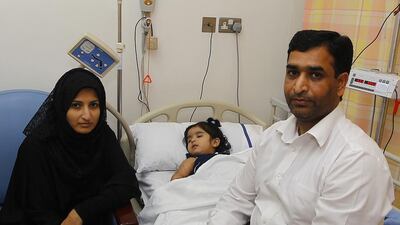DUBAI // Faheem Sultan’s daughter Shaheera was only five months old when her family noticed she was seriously unwell. She was not eating or growing properly and regularly fell ill with a fever.
They took her to Latifa Hospital in Dubai, where doctors diagnosed thalassaemia major, a serious blood disorder.
“Six months after Shaheera’s birth, the happiness we had changed into sorrow and the biggest fear,” her father said.
A bone-marrow transplant could cure Shaheera. Now a three-year-old, she requires monthly blood transfusions at the hospital’s thalassaemia centre and painful injections in her stomach every second day to control her iron levels, said Mr Sultan.
A transplant is not yet available in the UAE and like many expats, Mr Sultan, a Pakistani living in Sharjah who works for a contracting company in Dubai, cannot afford to pay the steep price of the operation in other countries and so must search for a cheaper option.
The family had arranged for treatment in Pakistan last year because the price was more affordable, but Mr Sultan said the quality was less reputable than in other countries. The transplant failed because the graft did not work properly, he said.
He now hopes to travel to Italy for the procedure, which he said would cost Dh1 million.
Thalassaemia is a group of inherited blood disorders that cause the body to make fewer healthy red-blood cells and less haemoglobin, a protein that carries oxygen throughout the body. They are among the most common inherited single-gene disorders in the world, according to the World Health Organisation (WHO).
“The burden of this disorder in many regions is of such magnitude that it represents a major public-health concern,” WHO says.
It can cause an increased risk of infection, bone deformities, iron overload, heart problems, spleen enlargement and retarded growth rates.
Not all of those with thalassaemia can have transplants, said Shakila Bashir Ahmed, 32, who works in media and administration at the Emirates Thalassaemia Centre and had thalassaemia major diagnosed when she was six months old.
“The bone-marrow transplant is usually a very expensive procedure that not all the patients can undergo,” she said. “Some patients are viable for it and some are not.
“I guess the expats over here have a problem collecting funds for bone-marrow transplantation because the costs can go from Dh1m to Dh10m,” she said.
Thalassaemia can be difficult for the parents as well as young patients.
“The main struggle is from the beginning. If the parents take care and give the medicines properly in the beginning so the child will grow and develop normally without any different facial features or things like that,” Ms Ahmed said.
“Then, as an adult, some patients have trouble finding jobs. That’s something people don’t understand.”
Abdul Basit Merdas, the vice chairman of the Emirates Thalassaemia Centre, said the biggest challenge for expats was finding a donor who is a genetic match, rather than the expense. Close family members, preferably siblings, offer the best chance of a match.
The country has two thalassaemia centres, in Dubai and Fujairah, he said. The UAE’s bone-marrow registry is available only at the Sharjah Blood Transfusion and Research Centre, part of the Ministry of Health.
Potential donors can go to the centre and, if eligible, answer a questionnaire and sign a consent form after tissue-typing is carried out. The donor’s data is then available to hospitals worldwide. A bone-marrow transplant, however, has yet to be carried out in the UAE.
“The Ministry of Health in the UAE is looking forward to having a specialised bone-marrow transplantation centre,” Dr Mahra Al Marzouqi, director of the centre, has said.
Mr Sultan said his wife, Beenish Hassan, was a 100 per cent match.
He also thanked the Dubai Government for covering the expense of his daughter’s blood transfusions so far.
“People are very generous here,” he said. “As a father, I just want to give a normal life to my daughter.”
lcarroll@thenational.ae

